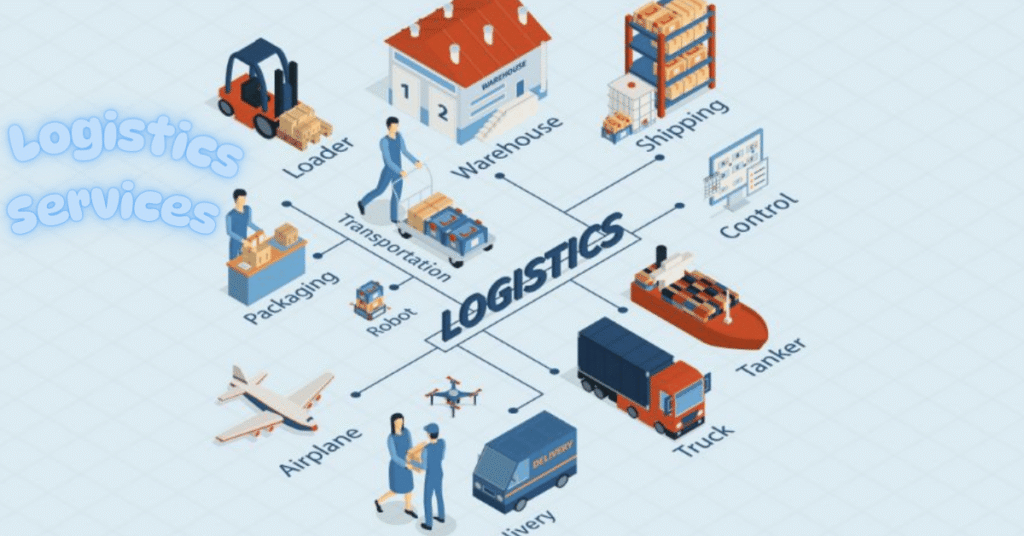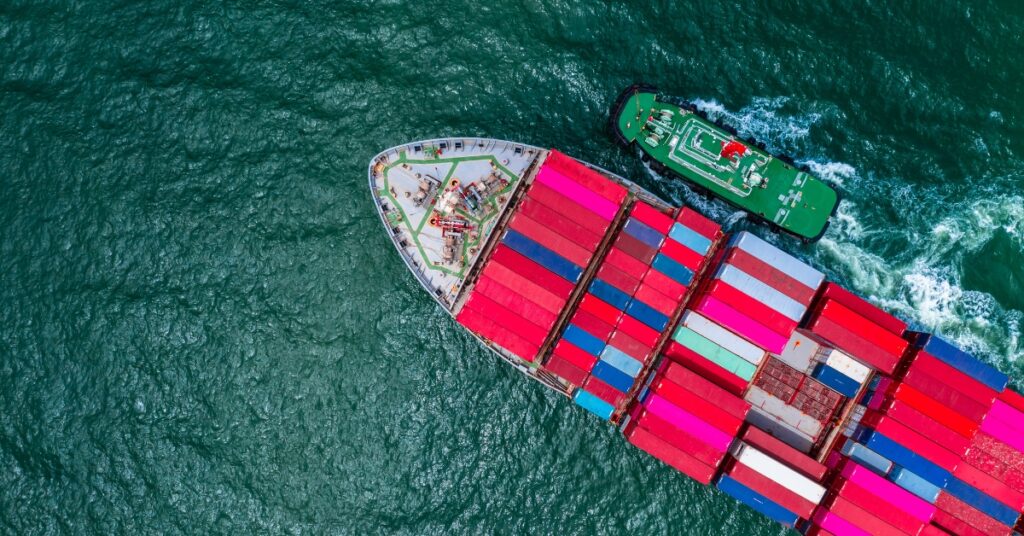Introduction
With such logic services, it’s like blood in every supply chain, in a somewhat globalized economy. Such logistics would facilitate the movement of raw materials into factories and the distribution of finished products to customers through transport and storage channels. It is this which seals the entire chain as one piece. In fact, without logistics, you would be killing business somewhere in the supply chain while consumers waited in an empty store.
This article will discuss logistics services, including what they are, how they evolved, industry realities, recent technological updates, benefits and challenges of logistics, and the future of the logistics industry.
Logistics Service?
Planning, implementing, and controlling incoming and outgoing flows, as well as the storage of goods, services, and all relevant information in a supply chain, from point of origin to point of consumption, is done in an effective way and in a very efficient manner to meet customer needs.
This definition covers a whole gamut of activities, from moving goods-transportation, warehousing, inventory control, packaging, freight forwarding, customs clearance, and distribution. The logistics glue all activities together to ensure that products get to their point of origin at an acceptable time and condition..
Logistics services include:
Transport
Transport is one of the most visible parts of logistics. Transport is needed to take goods from one place to another under the means of land, air, or sea. Most important is the time and, to the degree, the cost of achieving delivery to the desired point.
Warehousing
Or rather, warehousing will keep goods until the time they are needed. The modern logistics warehouses of today are intelligent spaces with automated systems, temperature controls, and inventory-tracking systems.
Inventory management
It is not all about keeping just enough of the stocks so that one does not overstock or understock. Most of the current logistics service providers employ advanced systems to enable them to provide upfront tracking of inventory in real time.
Freight Forwarding
Freight forwarders act as the acting agents between the shipper and the carrier. They handle all documentation, customs, and land transportation arrangements of cargo from one point on the international border to the other.
Packaging
The best way to protect the goods from damage during transit. Some logistics companies offer special packaging services of higher quality to control damages and also optimize space.
Distribution
It brings goods to the final consumer or retail outlets in the most efficient way. There are different levels of distribution to be accounted for, such as regional hubs and last-mile delivery.
Importance of Logistics to Business
Logistics services can be argued about, and they form part of competitive advantages in a modern-day business under a highly competitive environment. Some of the reasons one may require logistics are:
1. Customer Satisfaction
Delivering products timely, accurately, and safely leads to increased satisfaction and loyalty-from the perspective of a customer; logistics service is the last link in the customer experience chain.
2. Cost Optimization
Operational cost reduction is enabled under best-managed logistics operations. A company becomes efficient in cost consciousness through shipment consolidation, route optimization, or simply through the automation of processes.
3. Market Expansion
With proper logistics support, opportunities today may be seized by most countries for the marketing of their products worldwide; in fact, the least delays or complications would ensure easy access by the citizens of the world to place aggregate orders for those particular companies.
4. Risk Management
For example, logistics service providers try to envision what kind of variables could lead to disruption or create something bad, like bad weather or geopolitical developments, and come up with plans to reduce their impact.
5. Sustainability
Economic logistics waste green methods and packages just as well, to bring about a smaller carbon footprint by global sustainable criteria.
Classification of Logistics Services
The various models of logistics services apply to different kinds of businesses.
1. First Party Logistics (1PL)
Here, a business has full control over its logistics, being able to manage and execute its logistics activities with or without the involvement of any other logistics service provider. This is typical for smaller enterprises with little distribution.
2. Second Party Logistics (2PL)
With 2PL, companies transfer various functions, such as transportation functions, to the outside service provider.
3. Third-Party Logistics (3PL)
Based on the accepted definition, a 3PL integrates into a single operational method the performance of all transportation, warehousing, and order fulfillment logistics activities.
4. Fourth-Party Logistics(4PL)
4PL manages and controls an entire supply chain, usually involving multiple 3PLs in providing an integrated logistics solution.
Technology in Logistics Services
Modern logistics services are all highly tech-enabled. Below are some core technologies that are restructuring the logistics arena.
1. Robotic Warehouse Automation.
They convey systems that bring about shipment to robotic pickers or court Unmanned Aerial Vehicles.
2. Real-time condition
and monitoring of all operations, such as temperature and moisture, becomes a decision-making tool for timely maintenance on the vehicle using IoT.
3. AI helps in pattern recognition
To optimize delivery routes, predict forecasting demand, and act as support for the decision-making process across logistics networks.
4. Blockchain
These bring complete transparency to supply chain transactions by recording every transaction and movement of goods throughout.
5. Cloud Computing
The cloud facilitates real-time collaboration between stakeholders, easy data sharing, and easy work on scalability issues.
Benefits of Outsourcing Logistics Services
Outsourcing parts or sometimes all functions for logistics services is the way for most companies. Some core reasons are given below:
1. Expertise and Experience
Third-party providers provide an industrial knowledge-based workforce and networks, which the companies might not operate internally.
2. Scalability
Outsourcing enables a company to either ramp up or scale down its operations according to its requirements without investment implications.
3. Focus on Core Business
By handing logistics over to the experts, the company can concentrate on product development, marketing, and customer service.
4. Less Capital Investment
No investment in warehouses, trucks, or IT systems; everything was paid for by the logistics providers.
Challenges Confronting Logistics Services
Besides the massive advantages, different challenges thwart the success of logistics services:
1. Rising Costs
This is one reason that increases truly international domains with rising fuel prices and increasingly scarce manpower.
2. Supply Chain Disruptions
These factories destabilize the supply chain while delaying product releases and causing losses from all manner of external shocks: pandemics and wars, among others.
3. Compliance with Regulations
When it comes to the supply chain, foreign-level documentation and customs regulations could be quite difficult and time-consuming to comprehend.
4. Cybersecurity Threat
The digitized logistics have provided ease of opportunity for cyber-attacks and breaches, es afterward became prone to them.
Future Trends in Logistics Services
The light of the future seems bright for logistics services, yet they are on a significant transformation trend due to several ongoing trends.
Hyperlocal Delivery
With passing seconds, hyper-local delivery is now a big hit, needing implementation by the shortest possible time: today, once a Herculean task within hours, is now being seriously looked at closely by urban centers.
Predictive Analytic
Big data has great applications in predicting delays, optimizing routes, and enhancing inventory accuracy for logistics providers.
Logistics as a Service (LaaS)
LaaS is like Software as a Service; it is a demand model-cloud-based logistics solution for specific business needs.
Choosing the Right Logistics Partner
These are some major factors that the company would consider while selecting its logistics partner:
- Reliability and Customer Feedback
- Scope of Services
- Technological Capacity
- Flexibility and Scalability
- Customer Presence Worldwide
- Customer Support
The right partner will tremendously improve operational efficiency and customer satisfaction.
Case Study on the Amazon Logistics Empire
Out here will illustrate the best example of the company capturing the market through its logistics: it has fulfillment centers spread all over the world, its delivery network(Amazon Prime), and a close-to-real-time shipment tracking system that permits it to do deliveries from all over the world with precision and timeliness. Investments in drones and AI signal the light of logistics greatness ahead.
Logistic Services for Small Businesses
Not just giants; even small and medium enterprises (SMEs) stand to gain a huge deal from logistics services:
- Shared Warehousing
- E-Commerce Fulfillment
- Drop Shipping Services
- Cost-Effective 3PL Solutions
Mostly, 3PL service providers have packages developed for SMEs so they can rally together and compete with the big guys.
Conclusion
A worldwide competition presents changing demands for logistics, yet it remains an important factor in the epoch we are living in. Simply put, aiding world trade and building customer expectations are key to success for its organizations. We are nearly at the prospective distance where speed and intelligence would take over logistics, backed more by technology toward green logistics, a great change ahead.
Any organization whatsoever, be it a baby start-up or an industrial giant, that very rightly invested in a logistics strategy has either bounced back or is doing very well. Companies need a will to innovate together with their chosen partners for optimizing the supply chain.
FAQs
Q1. What are the logistics services?
Activities that govern the entire flow of goods from the initial source to delivery at the final destination, including transportation activities, warehousing, and distribution.
Q2. Differentiate between KPL and 4PL?
4PLs manage the entire supply chain industry for the management of different 3PLs, while 3PLs manage the logistics operations for themselves.
Q3. How does technology assist logistics services?
Routing and inventory management, tracking, and giving information to customers.
Q4. Which methods can an enterprise use for logistics cost reduction?
Outsource, route optimization, consolidation, and implementation of technology.
Q5. What is last-mile delivery?
The last stage of delivering orders from the distribution center to the customer’s doorstep is in today’s world.
Q6. Is logistics service only for big corporations?
Not really; these services can be availed by smaller businesses, making it flexible and pocket-friendly.



